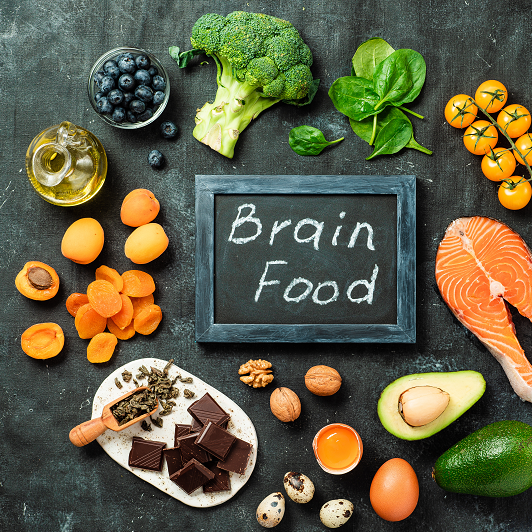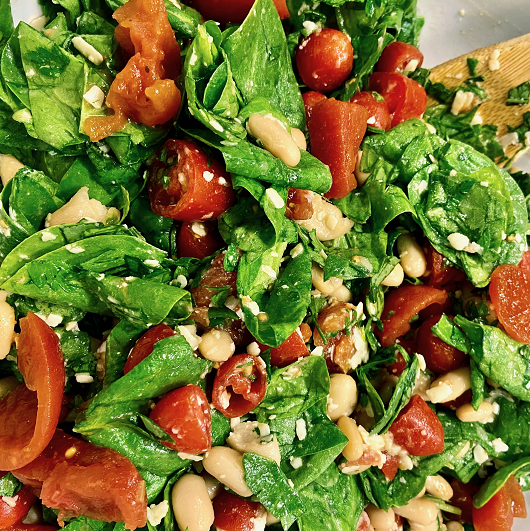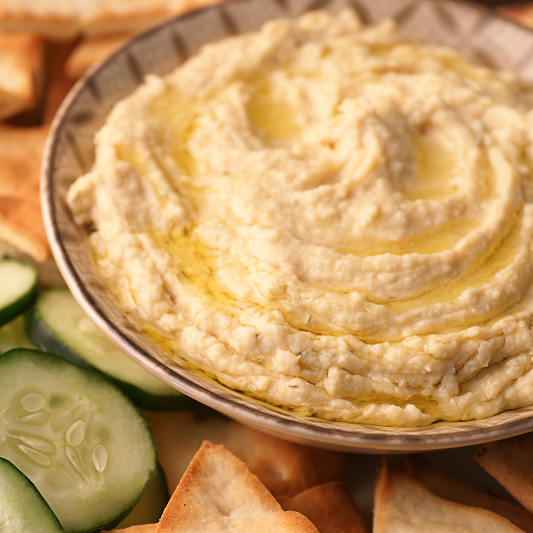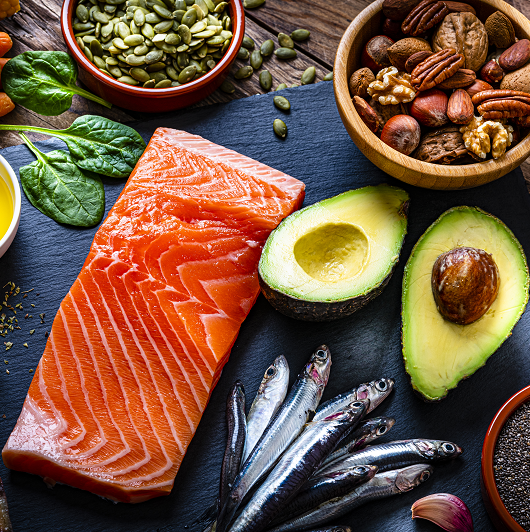Food for Thought: The Mediterranean Diet and Brain Health

June 24, 2025
Want to sharpen your mind and protect your brain as you age? The Mediterranean diet might be the answer. Research shows it can help prevent a range of health concerns and enhance our quality of life, even boosting brain health.
Along with potentially improving memory and focus and protecting your brain from age-related decline, the Mediterranean diet tastes great and is easy on the wallet, says Tara Piantadosi, a registered dietitian at Hackensack University Medical Center. We asked her to help us dig in.
What Is the Mediterranean Diet?
“When I mention the Mediterranean diet to people, they usually say, ‘Yeah, I’ve heard of that,’” Tara shares. “But often they don’t really know what it means.”
The Mediterranean diet is simply an approach to everyday eating that prioritizes:
- Vegetables and fruits
- Whole grains (think oats, brown rice or whole-wheat bread)
- Plant-based proteins from beans and legumes
- Nuts and seeds
- Healthy fats from olive oil and fatty fish
Fruits and Vegetables: Help Yourself
Unlike more restrictive diet plans for weight loss, the Mediterranean diet focuses more on what you are eating than on what you’re not. Plant-based foods are encouraged — in abundance — for the range of nutrients they provide.
Healthy Fats: Eat Your Omega-3s
Fatty fish like salmon, tuna, trout or mackerel are rich in omega-3 fatty acids. “Omega-3s are necessary for normal brain function,” Tara says, “but your body doesn’t make them, so you need to consume them in what you eat.”
Foods to Limit
Up to one serving per day of dairy (low-fat is best) is OK. But the diet does call for limiting refined sugars or carbs, other processed foods, and red meat to only very small, occasional quantities. Still, there’s plenty to fill up on — and good reason to do just that.
How Does It Help With Brain Health?
The benefits of the Mediterranean diet (and the similar MIND diet) have been studied widely by scientists, Tara notes. You can see clues to some of those benefits just by looking at your plate.
“If you’ve got a lot of different colors of fruits and vegetables — particularly the more vibrant colors, like in berries and leafy greens — you’re getting a lot of different antioxidants,” she says. Those power-packed combinations work together to support our health, which is one of the reasons it’s better to get nutrients from foods than from supplements.
Antioxidants and Omega-3s: Fighting Cell Damage in the Brain
Antioxidants are important because they battle an imbalance called oxidative stress, which can cause cell damage. That damage (and the related immune system response of inflammation) plays a role in neurological conditions like Alzheimer’s disease, Parkinson’s disease, multiple sclerosis and dementia.
Oxidative stress can be a particular problem for the brain. Here’s why:
- When our cells metabolize food to break it down into energy, a byproduct is released: free radicals. The brain is a very busy organ — it has a lot of metabolizing to do to make the energy it needs. So, the result is lots of free radicals, while others are simultaneously coming in from our environment, through sources like pollution and UV radiation.
- Our body is designed to do some free radical cleanup, but as we age, it’s not quite as efficient at that task. This can contribute to the imbalance that’s behind oxidative stress, where free radicals attack brain cells and cause problems like memory loss.
- Inflammation — our immune system’s “activation” response to fight infection or heal injuries —and oxidative stress are interrelated. When inflammation becomes chronic, it can add to any oxidative stress that’s already affecting the brain. And oxidative stress can make inflammation worse.
But the good news is that the Mediterranean diet and its antioxidants can help. Antioxidants have the power to neutralize free radicals, keeping them from damaging cells and thereby slowing down any loss of brain function.
Researchers have seen the evidence of the diet’s benefits in the brains of older adults. Those who followed the Mediterranean diet had fewer amyloid plaques — clumps of protein that interrupt communication across the brain, known as a hallmark of Alzheimer’s disease.
Where do omega-3s fit in? In many ways, they act like antioxidants, helping to neutralize free radicals and reduce inflammation. They too may help prevent amyloid plaques from forming.
Benefits Now, Not Just Later
It’s never too early to start protecting yourself against future problems. And by eating according to the Mediterranean diet, you could also improve your brain function right now.
- The nutrients you’ll be getting can help reduce the risk of stroke, which can happen at any age.
- They also can help lower blood pressure and improve blood flow and oxygenation for your brain, boosting your ability to do complex thinking and reasoning.
- The fiber in all those vegetables and whole grains may play a role, as well: It helps stabilize blood sugar so the brain gets a steady supply of fuel, which can be especially valuable when quick thinking is called for.
The Mediterranean diet may even improve your mental health. Studies in people diagnosed with depression have shown that eating this way can help them feel better. “That’s often an even bigger motivator for people I talk with than the potential to improve physical health,” Tara says.
What if I Don’t Like Mediterranean Food?
Not a falafel fan? Following the Mediterranean diet doesn’t mean eating Greek or Middle Eastern food for every meal.
The diet’s benefits were touted in the 1970s by an American scientist who had studied people living along the Mediterranean Sea in countries like Greece and Italy. He noted that they often had better health outcomes than those following an American-style diet, Tara says.
But there are more than 20 countries bordering the Mediterranean, and there are many more where the local diet lines up with this model of eating. “And we can modify the approach to fit anyone’s cultural preferences and tastes,” Tara points out. The principles can be applied to Asian, sub-Saharan African and other cuisines.
For example, Tara says, “I love grain bowls. “They’re super-easy to make and can be tailored to anybody’s preferences.”
Consider the possibilities for your own grain bowls. You can:
Start with a whole-grain base.
One option is brown rice, which may be associated with Asian countries and flavors.
- Alts: Try quinoa (South America), farro (the Middle East and Italy), amaranth (South and Central America) or millet (Asia and Africa), among others.
- Another approach: Use a mix of grains.
Add whatever vegetables you like.
These can be cooked or raw.
- Remember: The more colorful your bowl, the better.
- Save: Frozen veggies are just as nutritious as fresh, have a longer shelf-life and are often more affordable.
Add fatty fish or beans.
This is where your protein comes in.
- Tip: Low-sodium canned beans keep things quick and simple.
- Save: Tinned fish can cut down on cost versus buying fresh.
Add a splash of olive oil and your choice of seasonings.
Adjust flavors exactly how you like them — each family member can personalize their bowl.
- Spice it up: Drizzle on harissa, sriracha, salsa or hot sauce.
- Cool it down: Add a small dollop of tzatziki, raita or low-fat sour cream.
- Boost your umami: Use a dash of coconut aminos, Worcestershire sauce or fish sauce.
Add some crunch.
This finishing touch is optional but encouraged.
- Go nuts: Try sliced almonds, pistachios or chopped walnuts.
- Sprinkle some seeds: Options include sesame, chia, sunflower or pepitas.
Like the grain bowl, the Mediterranean diet overall “is very versatile and doesn’t have to be expensive,” Tara says. There are plenty of easy modifications and substitutions. If someone doesn’t like beans, for instance, she suggests trying them as a dip, using chickpeas to whip up an easy hummus.
Don’t eat fish? Try chia seeds, flaxseeds or walnuts, all excellent sources of omega-3s, she says. “The Mediterranean diet — and its brain-boosting benefits — can be accessible on so many levels.”
Is There a Mediterranean Diet Quick-Start Guide?
The short answer: Yes. “I like to build on what people are already doing in terms of meals or snacks,” Tara says. If you’re eating pasta or bread, next time you’re buying groceries, swap regular pasta or white bread for whole-grain versions.
“If you’re already having cereal or oatmeal in the morning, can you put walnuts on that?” she asks. “Or put fruit on it — 80 to 90% of Americans aren’t getting in the recommended number of fruits and vegetables per day, so just adding one more is a good starting point.”
Easy ways to up your veggie and fruit intake include:
- Breakfast: Blend spinach into your morning smoothie.
- Lunch: Add extra lettuce and tomato, or cucumber or bell pepper slices, or other vegetables to a sandwich.
- Dinner: Add spinach, zucchini, onion or bell pepper to pasta sauces and soups. Add berries or orange, pear or apple slices to your salads.
“With the Mediterranean diet, I really emphasize adding things over taking things away,” Tara reminds us. “Once you’ve added all these great fruits, vegetables and whole grains, some of those less-desirable foods may naturally start to drop away.” At the same time, you may well be adding an extra boost for your brain now — and protection for later.
Next Steps & Resources:
- Our source: Tara Piantadosi, M.S., RDN
- Learn more about nutritional programs and integrative health at Hackensack Meridian Health.
- Get personalized advice to achieve your best health: Call 800-822-8905 or visit our website to make an appointment with a primary care provider near you.
The material provided through HealthU is intended to be used as general information only and should not replace the advice of your physician. Always consult your physician for individual care.






